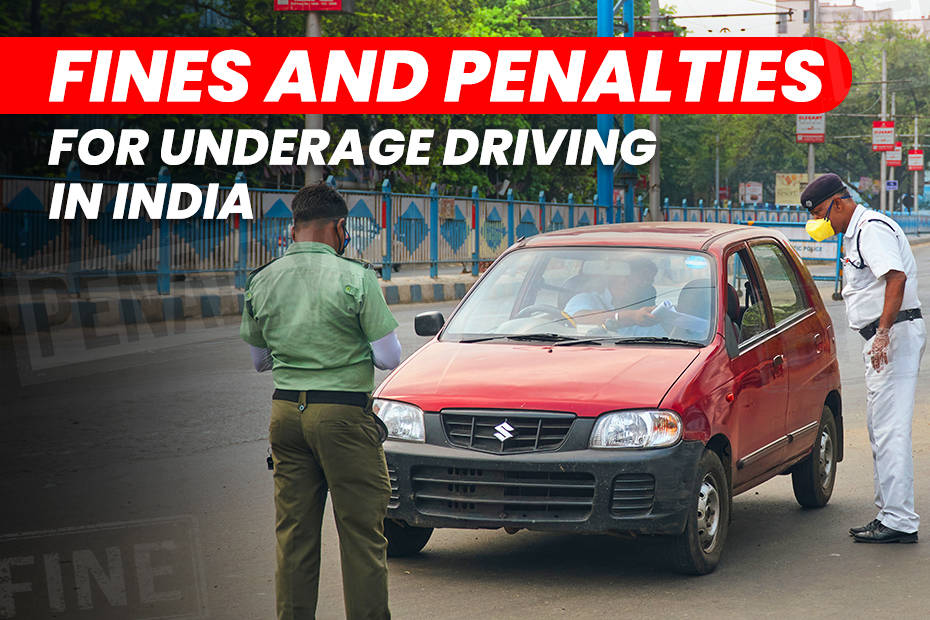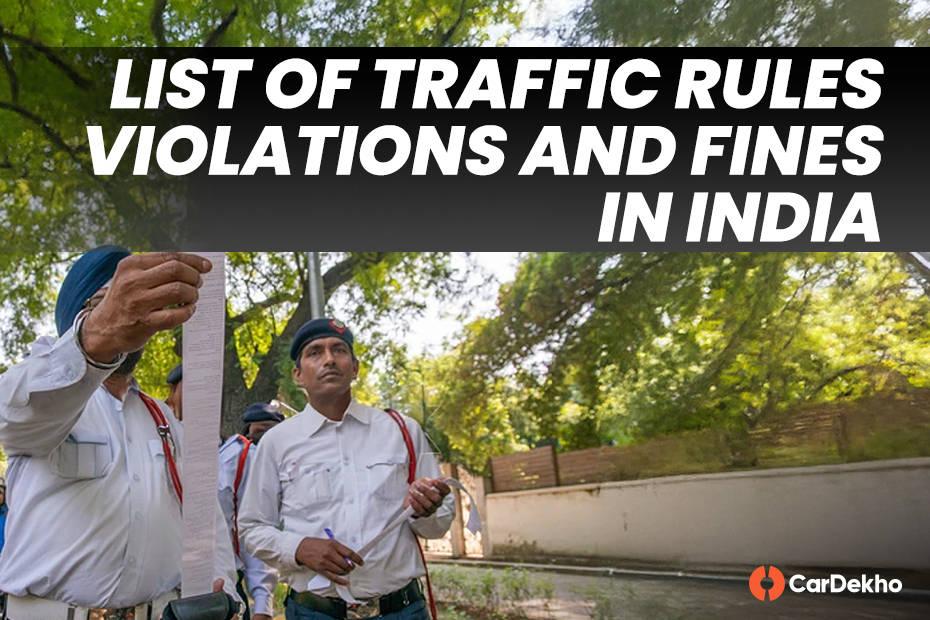Underage Driving In India: Fines And Penalties For Minors And Parents Explained
Modified On Jul 27, 2024 03:45 PM By Yashika
- Write a comment
Parents of underage drivers, be ready to pay fines up to Rs 25,000 and face imprisonment of up to 3 years!

One of the most important criteria for getting a driver’s licence in India is that the person must be a legal adult, i.e. 18 years or older. However, there has been an alarming increase in accidents, some fatal, where the person behind the wheel was underage. Such incidents are a serious matter, highlighting the need for stricter enforcement not just by the police but also by families.
Youngsters are often eager to drive, but can be reckless due to a lack of proper training. This endangers not only other road users, but also the minors themselves. But the law addresses such cases with various penalties and punishments for offences involving underage drivers, applying to both the minors and their parents and guardians.
Here’s a closer look at some of the fines and penalties for underage driving as stated in the Motor Vehicles Act, and the Juvenile Justice Act:
Fines And Penalties for Underage Driving in India

The penalties for offences related to underage driving were revised and updated to be harsher in 2019. Here are the currently defined penalties and fines as stated in the rules:
For Parents/Vehicle Owner/Guardians under Section 199A of the Motor Vehicles Act,1988
If a juvenile/minor commits any offence under this Act, the parent/guardian of the juvenile or motor vehicle owner will be deemed guilty and will be punished accordingly.
In addition to the penalty (as fixed by different state governments), the guardian or motor vehicle owner shall be punished with an imprisonment of up to three years and a fine of Rs 25,000. The vehicle's registration will be cancelled for 12 months.
For Vehicle Owners under Section 180 of the Motor Vehicles Act, 1988
If the owner of a vehicle allows a minor to drive the car, the owner can face legal consequences. These include up to three months of imprisonment, a fine of up to Rs 5,000, or both.
For Minors under Motor Vehicles Act,1988 and Juvenile Justice (Care and Protection Act) 2015
-
Under Section 199A of the Motor Vehicles Act: The fines and penalties mentioned above do not apply if the juvenile or the minor had a learner's licence and was driving a vehicle they were allowed to drive (motorcycle without gear with capacity not exceeding 50 cc). Also, if the guardian/parent/vehicle owner can prove that the minor was driving without their knowledge despite adequate vigilance and supervision, they may be exempt from penalties. If a minor commits an offence under this act, they won’t be able to apply for a driving licence until they turn 25. This is a big deal because it means they’ll face long-term consequences.
-
Under Section 181 of the Motor Vehicles Act: The minor who drives a motor vehicle shall be punished with up to three months in jail, a fine of up to Rs 5,000, or both.
-
Under Section 18 of the Juvenile Justice (Care and Protection Act): Although not specific to offences as listed in the Motor Vehicle Act, if a child is found guilty of committing an offence, several steps can be taken under the Juvenile Justice Act, 2015:
-
First, the child can be sent home with advice and counselling for both the child and their parents or guardian.
-
Sometimes, the child can be ordered to do community service under supervision.
-
A fine may be imposed on the child or their parents, but if the child is working, labour laws must be respected.
-
In some cases (likely those without any accident), the child can be released on probation with good behaviour, under the care of a parent, guardian, or a responsible person for up to three years, who must ensure the child’s good behaviour and well-being.
-
Alternatively, the child can be placed under the supervision of a responsible facility for the same duration.
-
Lastly, the child may be sent to a special home for up to three years, where they will receive education, skill development, counselling, behaviour modification therapy, and psychiatric support. If the child’s behaviour or circumstances suggest that staying in the special home is not beneficial, this decision can be reviewed and reconsidered.
-
Act of drunk driving by Juveniles, resulting in accidental killing: In India, the legal drinking age varies between 18 and 25 years, depending on the state laws. The Motor Vehicles Act of 1988, which was amended in 2019, contains specific provisions to address drunk driving under Section 185.
According to this Act, if a person is found driving a motor vehicle with a blood alcohol concentration exceeding 30 mg per 100 ml, or under the influence of drugs, they are subject to imprisonment and fines including potential imprisonment of up to six months for the first offence. Additionally, the offender's driving licence may be suspended, and repeat offences incur even harsher penalties.
If a teenager between 16 and 18 years old causes death or injury by driving a public service vehicle while being drunk, they can be punished with seven years or more in prison. They might also be treated as an adult, depending on their ability to understand and commit the crime.
NOTE: If the Juvenile Justice Board (a special court that deals with cases involving minors) reviews a case and decides that a minor (child) should be tried as an adult because of the seriousness of the offence, the Board can transfer the case to a higher court. This higher court, known as the Children's Court, has the authority to handle more severe cases and will conduct the trial following adult criminal procedures.
RTO Rules for Driving License for a Minor Driver
Currently, in India, a driving licence is issued upon completion of 18 years of age. However, individuals at 16 years of age can obtain a driver’s licence for a motorcycle without gears with a capacity of 50cc. This licence must be updated after turning 18 years of age. If a minor is caught driving any vehicle other than this, they face strict penalties and can only get their driving licence after turning 25 years old.
Also Read: New RTO Rules For Driving Licence In India: Are Driving Schools Ready?
Why Awareness and Enforcement Matter

It’s common to see minors out on the roads running errands, usually on a two-wheeler and sometimes in a car. Parents or guardians often think of this as an acceptable risk given the limited distance of travel and low likelihood of an accident. However, this creates a dangerous environment where the minor is okay with breaking the rules, putting themselves and others in danger without any sense of accountability.
When minors get behind the wheel without proper training and licensing, they endanger themselves and everyone around them. The lack of experience and maturity can lead to disastrous outcomes, as we've recently seen in Nagpur, Pune, and Hyderabad.
It is the responsibility of the parents and guardians to educate their children about the severe risks and consequences associated with accidents while driving, and why it is worth the wait to get the required training and then a licence. This includes having open discussions about the potential for accidents, injuries, and even fatalities. If their child is influenced by peers who are not getting similar guidance, they need to be extra vigilant to prevent the minor from using the vehicle without their knowledge.
Law enforcement must also be uncompromising in the enforcement of driving laws especially concerning minors on the road. There is not always a clear indication about someone operating a vehicle being a minor, and many adults in the country seem to travel without carrying all their documents. But traffic authorities need to play their part to the best of their ability to not only catch and punish such offenders, but also do community activities to educate and prevent such instances.
By creating a culture of safety and responsibility, we can significantly reduce the risk of dangerous incidents on the roads. Stay safe and drive responsibly!
3 out of 3 found this helpful












